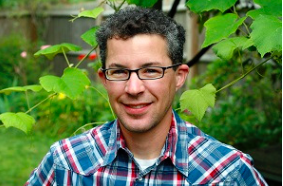Tanya Calvin
Editorials Editor
[caption id="attachment_4631" align="alignnone" width="283"] Alex Myers, who spoke at a recent assembly.[/caption]
Assemblies are probably one of the most talked about (and complained about) topics at Latin. Everyone always has something to say at 9:35am every other day, usually along the lines of “that was so…weird,” or “cool,” or “long.” Last year there were some questions about why Latin chooses the speakers that it does, whether or not those speakers get paid and if so, how much, and whether or not they reflected our community accurately. This fall, however, there was a new question posed after Alex Myers visited us.
“I don’t understand why we needed to have a transgender speaker, we all know they exist.” This statement, which I overheard in the hallway, made me wonder and I brought it up in other conversations. Some people were angry, but others brought up an interesting point: why do we have minority speakers come to Latin?
This isn’t to say that students don’t want people of certain races, religions, genders, etc. to share their stories with us. Latin isn’t a closed-minded place. It’s just a question, and there are no bad questions. They’re what makes us the engaged and curious community that we are. This question, essentially, is asking what the point of our assemblies is.
I asked Ms. Stevens, one of the Upper School Counselors and one of the people that helped set up Myers’ visit, what she thought about this question. She pointed out that “knowing they exist” isn’t enough, especially if Latin is going to be a place “that embraces diversity of people, cultures and ideas,” as it says in our Mission Statement. In order for a community made up of people from different backgrounds to be a safe place, there has to be a certain level of understanding of those around you. Most of that comes from hearing each others stories and knowing where we’re all coming from. Having speakers that represent our identities allows us to see ourselves and everyone else in a bigger context than Latin’s.
An anonymous member of the C.A.U.S.E. feels that their peers at Latin don’t truly know what it means to live as a gender and/or sexuality minority in the world today. “It’s not just people looking at you funny or asking weird questions, there’s consequences to choosing to [embrace] who you are.” Gender and sexuality, like race, aren’t choices, but how and how much you choose to express your identity is. The way those choices change our everyday lives affects all of us and it’s our responsibility to recognize those experiences.
We all know the saying “don’t judge a book by its cover,” but that’s what we’re doing if we decide that just knowing that a group of people exists is enough. Remember that we’re different, and diversity doesn’t work by just changing the statistics. Diversity is supposed to create equality and freedom, and it can only do that if we take the time to at least hear our perspectives.]]>
Alex Myers, who spoke at a recent assembly.[/caption]
Assemblies are probably one of the most talked about (and complained about) topics at Latin. Everyone always has something to say at 9:35am every other day, usually along the lines of “that was so…weird,” or “cool,” or “long.” Last year there were some questions about why Latin chooses the speakers that it does, whether or not those speakers get paid and if so, how much, and whether or not they reflected our community accurately. This fall, however, there was a new question posed after Alex Myers visited us.
“I don’t understand why we needed to have a transgender speaker, we all know they exist.” This statement, which I overheard in the hallway, made me wonder and I brought it up in other conversations. Some people were angry, but others brought up an interesting point: why do we have minority speakers come to Latin?
This isn’t to say that students don’t want people of certain races, religions, genders, etc. to share their stories with us. Latin isn’t a closed-minded place. It’s just a question, and there are no bad questions. They’re what makes us the engaged and curious community that we are. This question, essentially, is asking what the point of our assemblies is.
I asked Ms. Stevens, one of the Upper School Counselors and one of the people that helped set up Myers’ visit, what she thought about this question. She pointed out that “knowing they exist” isn’t enough, especially if Latin is going to be a place “that embraces diversity of people, cultures and ideas,” as it says in our Mission Statement. In order for a community made up of people from different backgrounds to be a safe place, there has to be a certain level of understanding of those around you. Most of that comes from hearing each others stories and knowing where we’re all coming from. Having speakers that represent our identities allows us to see ourselves and everyone else in a bigger context than Latin’s.
An anonymous member of the C.A.U.S.E. feels that their peers at Latin don’t truly know what it means to live as a gender and/or sexuality minority in the world today. “It’s not just people looking at you funny or asking weird questions, there’s consequences to choosing to [embrace] who you are.” Gender and sexuality, like race, aren’t choices, but how and how much you choose to express your identity is. The way those choices change our everyday lives affects all of us and it’s our responsibility to recognize those experiences.
We all know the saying “don’t judge a book by its cover,” but that’s what we’re doing if we decide that just knowing that a group of people exists is enough. Remember that we’re different, and diversity doesn’t work by just changing the statistics. Diversity is supposed to create equality and freedom, and it can only do that if we take the time to at least hear our perspectives.]]>
This Is Why We Have Assemblies















































bchesler • Dec 2, 2014 at 12:23 pm
I’ve personally heard the question “Why do we have these speakers as opposed to other speakers?”. I don’t think too many people question the idea of bringing in transgendered individuals, or other such minority groups. In a perfect world, we’d be able to bring all groups into our halls to express their opinions and views. But that’s simply not the world that we live in. We only have so much time to give to our speakers, so we need to make sure that those that we choose to speak before us are of the utmost relevance and importance to us and our society. Bringing in minorities is great, but we need to decide which speakers should come before others. For example, nearly all of our speakers have subscribed to liberal political ideologies. I don’t think I’ve once seen a speaker at our school that has expressed conservative beliefs. Transgendered individuals make up just about 0.002% of the entire population of the USA according to the William Institute of Law. Conservatives make up about 50% of the entire population of the USA. If our goal is to best understand the ideas, beliefs, and experiences of other peoples, it would be in our best interests to understand groups that compose large groups within our society that we haven’t heard from yet. While it is a noble goal to have all sorts of minorities express their views before the entire student body, it’s not going to have as positive of an affect if we put them before speakers that represent larger groups.
dmarshall • Dec 2, 2014 at 11:19 am
Great editorial, Tanya. If someone asked me why Latin has assemblies, I’d say that, without speakers of diverse experience, Latin (or any school) risks becoming an insular place devoted to confirming biases instead of challenging them. Thinking you know what someone’s life is like (or being happy with simply knowing some such people exist) comes close to denying the value of education altogether. Education isn’t about comfort or complacency. If you’re finished thinking or growing or trying to understand and benefit from the learning and testimony of others, why go to Latin?